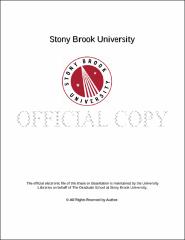| dc.identifier.uri | http://hdl.handle.net/11401/77547 | |
| dc.description.sponsorship | This work is sponsored by the Stony Brook University Graduate School in compliance with the requirements for completion of degree. | en_US |
| dc.format | Monograph | |
| dc.format.medium | Electronic Resource | en_US |
| dc.language.iso | en_US | |
| dc.publisher | The Graduate School, Stony Brook University: Stony Brook, NY. | |
| dc.type | Dissertation | |
| dcterms.abstract | In the Humanities, studies on the legacy of enslaved Black women are often split along ethnic, cultural, linguistic and national lines. My dissertation brings together literatures and visual arts from Puerto Rico, Martinique, Suriname, the Dominican Republic and the U.S. representing a myriad of linguistic and cultural traditions that turn to the legacy of the historical Black female body as their myth of creation. I position these works under the heading of Plantation Zone Literatures and Visual Arts, a term I use to indicate the centrality of Black women's genealogy in 20th-century and 21st-century works from the Black Diaspora. Once a geographic space where Africans and their heirs were forced to labor, the Plantation Zone serves as a metaphorical site where the legacy of the historical Black female body--in multifarious forms of triumph and pain--is celebrated in Black Diasporic literatures. In this project I argue for a shift in the study of literatures of the Americas from a Eurocentric lineage that supports the European conquest of the New World, to an approach that locates the birth of the Americas in the history of the Plantation Zone. My methodology relies on an interdisciplinary model, with works from historians, ethnographers, sociologists and philosophers grounding my analysis of the epistemological confrontation that occurs when fictionalizing Black women. My intervention in the fields of Africana Studies, Caribbean Studies, Latina/o Studies and Transamerican Studies comes through examining how the friction between the real and the imagined offers new ways of thinking about literatures of the Americas through the matrilineal genealogy of the Black Diaspora. | |
| dcterms.available | 2017-09-20T16:52:53Z | |
| dcterms.contributor | Scheckel, Susan | en_US |
| dcterms.contributor | Cooper, Helen | en_US |
| dcterms.contributor | Hurley, E. Anthony | en_US |
| dcterms.contributor | Harris, Dawn. | en_US |
| dcterms.creator | Chanza Torres, Eileen S. | |
| dcterms.dateAccepted | 2017-09-20T16:52:53Z | |
| dcterms.dateSubmitted | 2017-09-20T16:52:53Z | |
| dcterms.description | Department of English. | en_US |
| dcterms.extent | 245 pg. | en_US |
| dcterms.format | Application/PDF | en_US |
| dcterms.format | Monograph | |
| dcterms.identifier | http://hdl.handle.net/11401/77547 | |
| dcterms.issued | 2015-08-01 | |
| dcterms.language | en_US | |
| dcterms.provenance | Made available in DSpace on 2017-09-20T16:52:53Z (GMT). No. of bitstreams: 1
ChanzaTorres_grad.sunysb_0771E_11459.pdf: 919587 bytes, checksum: 0acf31928d88a353c9396fbf416a3267 (MD5)
Previous issue date: 2013 | en |
| dcterms.publisher | The Graduate School, Stony Brook University: Stony Brook, NY. | |
| dcterms.subject | Black Woman, Genealogy, Matrilineal, Plantation Zone, Poetics, Transamerican Studies | |
| dcterms.subject | American studies | |
| dcterms.title | From the Plantation Zone: The Poetics of a Black Matrilineal Genealogy for the Americas | |
| dcterms.type | Dissertation | |

